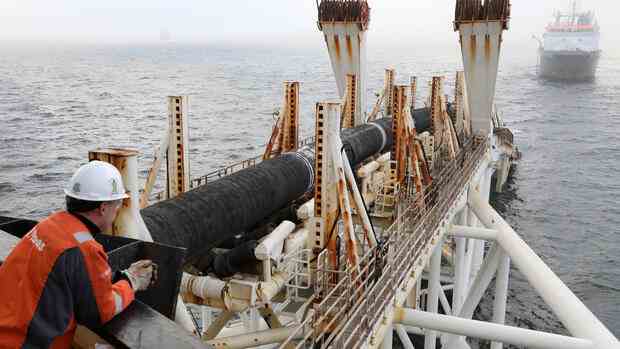The parliamentary review of the background to the controversial Nord Stream 2 gas pipeline has picked up speed. The “Climate Foundation” investigative committee in Mecklenburg-Western Pomerania met in public for the first time on Friday. It is primarily about the foundation with which the state wanted to avoid sanctions when building Nord Stream 2. Ultimately, however, the committee examines the pros and cons of the gas pipeline and Russia’s influence on the government in Schwerin and in Germany as a whole.
The committee had invited two experts to the hearing in the state parliament: Christian von Hirschhausen from the Technical University of Berlin, who is known as a critic of the pipeline, and Jens Hobohm, director of the market research company Prognos. At the beginning of 2017, Hobohm presented a study commissioned by Nord Stream 2 AG, with which the operating company justified the importance of the pipeline for European gas supply. Nord Stream 2 AG, based in Switzerland, is 100 percent owned by the Russian Gazprom group.
Even the scientific advocate of the Gazprom subsidiary no longer wanted to support the project unconditionally. When asked by a member of parliament whether the construction was necessary, Hobohm found the answer: “No.” Among other things, he justified his answer with the fact that this question had not been dealt with in the commissioned study.
Experts oppose the line of the federal government
According to him, there were certainly economic reasons for Nord Stream 2, as it would have been cheaper to operate than other pipelines. The ultimate aim of the construction was to replace the transit of Russian gas through Ukraine. Transit is expensive as infrastructure is outdated and considered poorly maintained. The transport losses are correspondingly high. However, transit is an important source of income for Ukraine.
Top jobs of the day
Find the best jobs now and
be notified by email.
In retrospect, the Prognos expert sees economic reasons that would have spoken in favor of the project. “I would agree with you that Russia was pursuing geopolitical goals with the project,” said Hobohm when asked by a member of parliament. For von Hirschhausen, Nord Stream 2 was primarily used to “bypass the pipeline capacities in Ukraine”. This was already apparent at the time of planning.
>> Read here: Controversial climate foundation MV advertises new funding program
With their verdict, the experts are going against the line of the federal government. Chancellor Olaf Scholz had emphasized in December 2021, two months before the Russian attack on Ukraine, that Nord Stream 2 was a “private-sector matter”. His predecessor, Chancellor Angela Merkel, had already taken this view. The last Economics Minister of the Merkel era, Peter Altmaier, had always championed this thesis.
Germany had had to listen to a lot of criticism about Nord Stream 2 in recent years. Eastern European EU countries in particular had vehemently opposed Nord Stream 2. The EU Commission also made every effort to prevent the project. Resistance from the US government was particularly fierce. In the summer of 2021, a few weeks before the federal elections in September, Merkel had made a concession to US President Biden to stop the operation of the pipeline if Russia used it as a means of exerting pressure on Ukraine.
In response to Russia’s aggressive behavior towards Ukraine, the federal government suspended the approval process for Nord Stream 2 on February 22 last year, two days before the start of the Ukraine war. As recently as 2021, Germany had covered 55 percent of its natural gas requirements with Russian gas. Most of it flowed to Germany via the Nord Stream 1 pipeline, which went into operation in 2011. After the outbreak of war on February 24, 2022, Russia largely stopped supplying gas to Germany. The Nord Stream 1 and 2 pipelines have now been destroyed after explosions for which Russia is responsible, according to Western intelligence services.
State government has withheld documents
The committee of inquiry was set up under pressure from the opposition, consisting of the CDU, FDP and Greens. In recent months, parliamentarians have met behind closed doors; mostly it was about formalities. The red-red state government, headed by Manuela Schwesig (SPD), had withheld documents for a long time. In the meantime, at least some of the necessary documents have been handed over to the committee.
>> Read here: Board of the controversial climate foundation MV resigns
The Jamaica opposition also wants to summon Schwesig and her predecessor Erwin Sellering, who took over the management of the climate foundation. This was intended to circumvent the sanctions threatened by the USA against companies involved in the construction of the pipeline.
The foundation, whose purpose according to the statute was to support environmental and nature conservation issues, was also to coordinate and pay for work to complete the pipeline. The reasoning behind this: companies that received orders from the foundation would not be sanctioned by the Americans.
The initiative to establish the climate foundation came from the state government under Schwesig, but the business operation was financed by Gazprom. The Russians have invested 20 million euros.
More: Gas prices continue to fall
